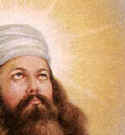Zarathushtra’s Philosophy - Basic Overview
Ahura Mazda
Literally translated, Ahura means The Lord Creator, and Mazda means Supremely Wise. This was the name by which Zarathushtra addressed his God. He proclaimed that there is only one God, who is the singular creative and sustaining force of the Universe. Zarathushtra was the first Prophet who brought a monotheistic religion.
Choice
As human beings we are given the right to choose. However, because of the law of cause and effect, we are also responsible for our choices, and must face their consequences.
Dualism
Even though there is only one God, our universe works on the basis of moral dualism. There is Spenta Mainyu (progressive mentality) and Angra Mainyu (evil or regressive mentality). Zarathushtra pleaded with us to think clearly before we choose, and asked us to choose the progressive choices to bring about beneficial consequences. He said that Ahura Mazda would not order us to choose either this or that.
In other words, having given us the ability to choose, Ahura Mazda leaves us alone and allows us to make our choices. And if we choose good, we will bring about good, and if we choose evil, we will cause evil. This is how the moral universe operates.
Devil / Ahriman
Based on the previous principle, we are the causes of all the good and all the evil that happens in our moral universe. Or simply stated, according to Zarathushtra, there is no Devil. However, some of the Post-Zarathushtra scripture introduced the concept of the Devil, or Ahriman, which was effectively a personification of Angra Mainyu.
Purpose in Life
To be among those who renew the world… to make the world progress towards perfection.
Happiness
Happiness is a byproduct of a way of living. And happiness is for those who work for the happiness of others.
Amesha Spentas (Holy Immortals)
Zarathushtra tells us that Ahura Mazda created everything based on the 6 Amesha Spentas, which are in fact divine emanations or aspects of the creator. These are:
- Vohu Mano – The spirit of the Good Mind
- Asha – The spirit of Truth and Right
- Khshatra – The spirit of Holy sovereignty
- Spenta Armaiti – The spirit of Benevolent Devotion and Love
- Haurvatat – The spirit of Perfection and Well-Being
- Ameretat – The spirit of Immortality.
According to Zarathushtra not only the universe was created on the basis of these six, but also they permeate every aspect of creation including ourselves.
Angels
Later on, Post-Zarathushtra Zoroastrianism mythologized the Amesha Spentas into angelic hierarchies, and brought back some of the Pre-Zarathushtra Gods into the scripture as angels.
Cosmology
Ahura Mazda first created Vohu Mano or the Spirit of the Good Mind, through which God created a plan or blueprint for the universe. Part of this blueprint was to incorporate an operating mode and operating laws. This was Asha or the spirit of Truth and Right (the software of the universe).
Then comes the actual act physical creation, which involved certain actions and manifestations. This is Khshatra or the spirit of Holy Sovereignty. These manifestations are actualized through Spenta Armaiti, with much devotion, faith and love.
And finally that the universe is created in the spirit of Perfection (Haurvatat) and is timeless and immortal (Ameretat).
Microcosm
Each one of us carries the divine essence within ourselves. It is our duty to recognize this and act accordingly. How?
Based on Zarathushtra’s teachings, we can and should act like Ahura Mazda. We should think about every choice that we wish to make and in the spirit of our good mind choose wisely. We should respect the natural and moral laws and operating mode of the universe. We should act diligently, with love and faith. And we will then make perfect and timeless choices, and fulfill our purpose of renewing the world.
Co-workers
We are co-workers and co-creators of God. We are here to fulfill the divine plan, not to become obedient slaves of God, nor to be helpless children of God. And this is why we are given the choice. Even the choice not to cooperate with God’s plan and go against it, and that is why we find evil in the world. Because there are some who choose not to work according to God’s plan.
Heaven and Hell
According to Zarathushtra after we leave this life, our essence leaves the body, and depending on the choices that it has made, either it will go to the House of Songs or Realm of light (if he has made good choices) or to the Realm of Darkness and Separation (if evil choices).
Heaven and Hell are not physical places, but are described as timeless states of consciousness: either state of oneness with or separation from Ahura Mazda.
Post-Zarathushtra Zoroastrianism mythologized these timeless states of consciousness into everlasting physical locations and descriptive places. This later concept permeated into Judeo-Christian religions.
Some Corollaries
There is only one way to fight evil, and that is by spreading goodness, just as there is only one way to fight the darkness, and that is by spreading light. Similarly, only by spreading love can we eliminate hatred and enmity, and not by fighting and opposing each other.
Some Basic Maxims of Zoroastrianism
Humata, Hukhta, Huvarshta, which mean: Good Thoughts, Good Words, Good Deeds.
There is only one path and that is the path of Truth.
Do the right thing because it is the right thing to do, and then all beneficial rewards will come to you also.
© Shahriar Shahriari
Vancouver, Canada
April 1, 1998
